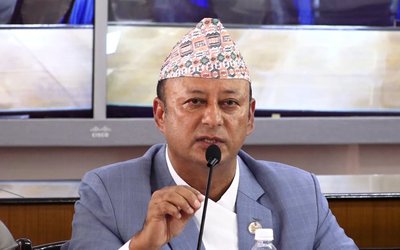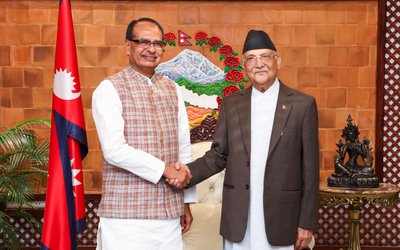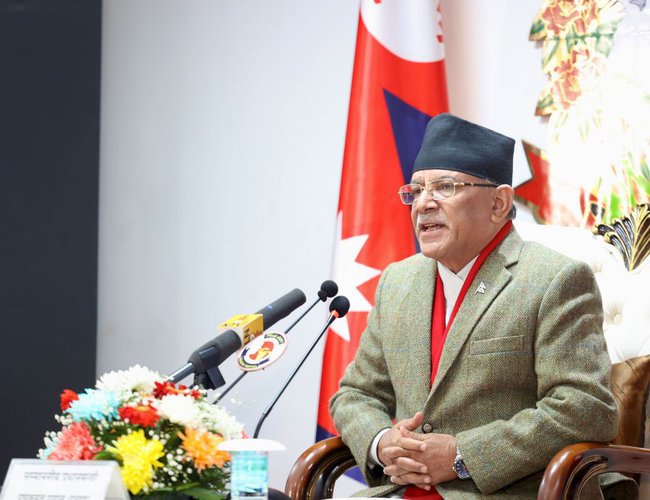
Two massive anti-government demonstrations took place in Kathmandu just a month ago. One was led by Durga Prasai, a non-political actor, and the other by the Melamchi Water Concern Group, a non-political consumer group in the Kathmandu Valley.
Prasai's agitation was political. The second agitation, however, was purely consumer-driven, seeking the continuation of Melamchi's drinking water supply, a project funded by the Asian Development Bank and completed three years ago during the tenure of Prachanda's rival KP Sharma Oli.
Although the project's headworks were damaged by floods two years ago and the temporary diversion headworks buried last June, the water supply should have resumed by the end of October with a little maintenance work.
However, apathy on the part of the ministry responsible has delayed the cleanup. With the massive demonstration of the consumers and the inspection visit of the Minister of Water Supply and the Speaker of the House of Representatives, the project has awarded the contract to clean the headworks for the resumption of the water supply.
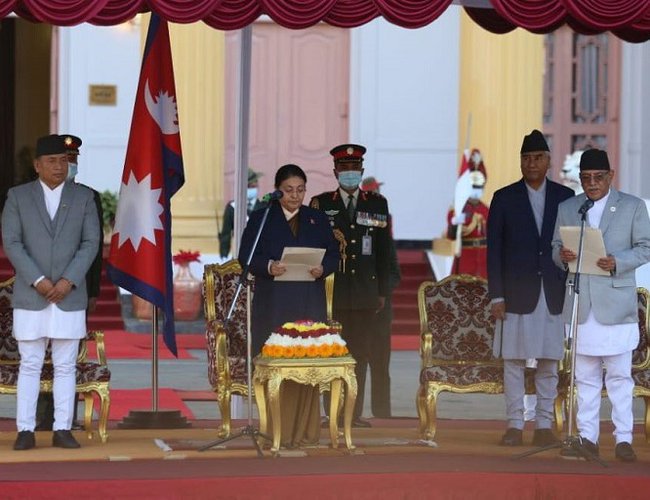
Had there been a technical expert like the then secretary Madhav Belbase, who is now a member of the Public Service Commission, the water supply would have started a long time ago. Due to the inefficiency and apathy of the minister and the project, the rehabilitation work did not start for long.
As the Prime Minister, Prachanda has to take the responsibility. Given this scenario, Prime Minister Pushpa Kamal Dahal Prachanda has to take some drastic step to make the delivery system effective.
Addressing the nation on the completion of one year in office on Tuesday, the Prime Minister said, "Today, in this declaration, I admit to the people of the nation that the government has not failed but the results have not met my aspirations."
"I publicly declare that the working style of the government will now undergo a change," Prime Minister Prachanda said.
He also said that except for certain predetermined and unavoidable events, he would not be involved in external.
“I am restructuring the Prime Minister’s Office this week, this will serve as a signal and a message for the entire state,” he stated.
Prime Minister Prachanda has claimed that the 2080s will mark a decade of rapid development.
Prime Minister Prachanda noted that the development initiatives would be implemented in a manner that the citizens can realise their impact. He further mentioned, “This year, a total of 776.61 kilometres of blacktopped roads and 587.5 kilometres of graveled roads have been successfully constructed.”
During this period, 181.29 km of new track has been opened, he said, adding, “An additional 162,000 safe houses have been constructed and provided to the beneficiaries.”
While this figure indicates progress compared to previous years, I am not satisfied with the outcomes, he added. He informed that he was discussing policy and practice to ensure a minimum of two shifts in infrastructure development, aiming to align it as closely as possible to the ‘barracks model’.
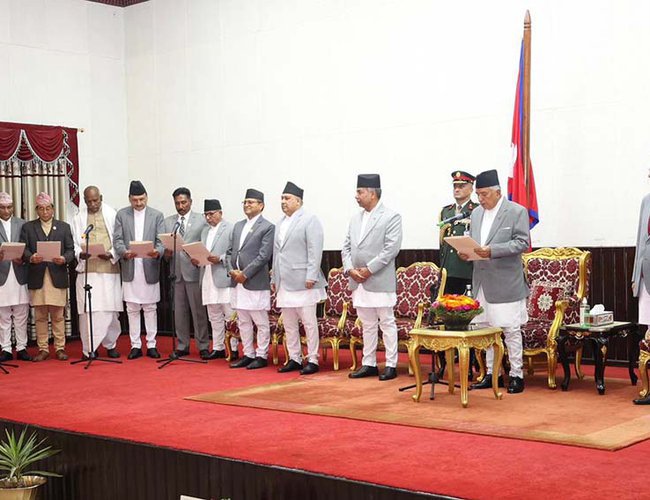
He said that necessary initiatives would be taken to increase production by augmenting exports.
This year, there’s a 2.7 percentage point decrease in the consumer price growth rate compared to last year, he said, adding enhancing government policy and administrative capability is now his priority to further lower the inflation rate and make people realise the change. He also announced to expand the scope of health insurance.
Stating that the government was committed to ensuring effective implementation of Health Insurance Act, he pledged to enhance current insurance coverage and integrate all free programmes, excluding the fundamental ones, into a unified health insurance framework.
He further said that significant success was achieved in fostering trust in democracy by dismantling the VIP culture. Stating that previously a 'VIP culture' prevailed where high-profile individuals seemed untouchable by the law, he said, following the government's extensive investigation and action, even top-ranking officials, once deemed beyond law's reach, are now being held accountable.
Furthermore, the Prime Minister announced that political appointments in universities would come to an end and a merit-based approach would be adopted.
“Top-level meetings will now convene with the aim of enhancing universities, shaping a unified national perspective on foreign policy, fostering job creation, and enhancing the nation's image for investment, rather than solely focusing on power distribution,” he added.
Qualified Nepalis residing anywhere in the world can aspire to become the Vice-Chancellor by presenting a transparent and convincing plan for university reform, he added.
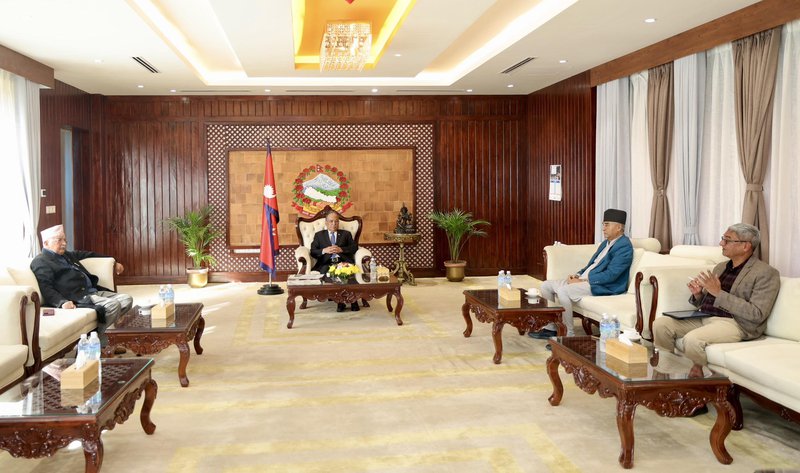
“Meritocracy will now start and Tribhuvan University will be the point of departure," he added.
Prime Minister Prachanda has said that he is determined to complete the rest of the peace process with consensus.
Terming Nepal's peace process 'unique and exemplary’ for the world, he stated that it has gained recognition at the international stage. "However, some tasks of the process remain to be completed. Now, I am determined to complete the rest of the peace process with consensus," he said in his address to the nation on Tuesday.
PM Prachanda said that during his foreign visits as the Prime Minister, he clearly stated the priorities, interests and issues of mutual cooperation of Nepal with the concerned countries.
"A strong and balanced relationship has been maintained with India and China. The cooperation and support of these neighbouring countries has increased in Nepal's development efforts. At the World Food Conference held in Rome, Italy, Nepal's presentation on food security and solving the problems of underdeveloped countries has drawn the world's attention," he said.
Likewise, the content presented by Nepal in the General Assembly of the United Nations and its other meetings has received international attention. According to him, the United Nations Secretary General's visit to Nepal at his invitation and Nepal's presentation at the Climate Change Conference held in Dubai last month, 'COP-28', were effective.
Similarly, Tatopani-Khasa, Rasuwa-Kerung, Hilsa-Purang and Korala border point of Mustang, which have been closed for a long time, have been opened for bilateral trade. "I raised the issue of tri-national connectivity for the second time when I was the Prime Minister and announced to build the road corridor to connect China and India. Now the work of the Mahakali Corridor is moving at a fast pace. The budget has been assured for the Dipayal-Khutia road connecting Taklakot in Tibet," said PM Prachanda.
Meanwhile, he also expressed his commitment to prove wrong the statement that the water of Melamchi will not come to Kathmandu, and said that he is working with a compact plan of 28 days with the target of delivering 170 million litres of water a day to the water treatment plants at Sundarijal within a month.
PM Prachanda also said that the minimum wage of workers in the country has been increased to Rs. 17,350. More than 950,000 people who have gone for foreign employment or are self-employed abroad, are in the informal sector or are self-employed within the country have been included in the contribution-based social security scheme.
Similarly, PM Prachanda said that the government's diligence in search and rescue operations in the aftermath of the Jajarkot earthquake has increased the trust of the people towards the state. The government has decided to provide Rs. 50,000 per family for the construction of temporary housing for the families whose houses have been damaged in the earthquake and are not fit for habitation. Rs. 2.26 billion has been disbursed for the same. The temporary reconstruction work will be completed within a month, said the Prime Minister.
"Development cannot be accelerated without democracy being strong, and its benefits cannot be equally distributed among the people. Now some people have resorted to false and misleading propaganda to create resentment towards the system," said PM Prachanda while adding that their comment that the unitary rule was better than the republication system now is completely wrong.
"I am firm in favour of strengthening the provinces. Lately, I have heard and understood the dissatisfaction of the chief ministers. I assure them through this speech today that all knots of federalism are being untied very fast," he said. "It was me who convened the first meeting of the National Coordination Council."
Today, I want to bear witness to the people and also tell the ministers that we cannot afford to fail. I am in no condition and mood to forgive anyone for poor performance, stated PM Prachanda. "If I cannot create positive change and hope in the country, there is no need for me to hold the position," he said.
He also said that he would continue to strive for dialogue and understanding with the main opposition and other political parties for the implementation of the important issues related to the execution of the constitution, and for cooperation on other issues of national importance to complete the remaining work of the peace process.
Similarly, Prime Minister 'Prachanda' has said that the government is now focusing attention on game-changing large hydropower projects.
He said that India, Bangladesh and China are ready to become partners in our electricity trade, so the government has embarked on mega hydropower projects as a game changer.
He said that the infrastructure tax levied on petroleum products for the Budhigandaki hydropower project will be made available to the same project and there will be no dearth of resources.
The Prime Minister said that further study of the Karnali Chisapani hydropower project with a capacity of 10,800 megawatts has been started by the Nepal Electricity Authority with a goal of completing it within three years.
Likewise, study of the Mugu Karnali hydropower project of 1,902 MW capacity has been completed, Prime Minister Prachanda said, adding that he is also directly facilitating the 900 MW capacity Arun III hydropower project and the work of raising investment for the 1,063 MW Upper Arun hydropower project has reached its final stage.
Stating that about 564 megawatts of electricity will be added from additional projects undergoing testing commissioning within next two to three months, he said that power purchase agreements for 9,164 megawatts of hydropower projects have been completed with the private sector.
Out of this, power purchase agreements for about 2,200 megawatts have been completed this year alone, he said. Similarly, Prime Minister Prachanda said that the government is planning to implement the subsidy system based on production of power.
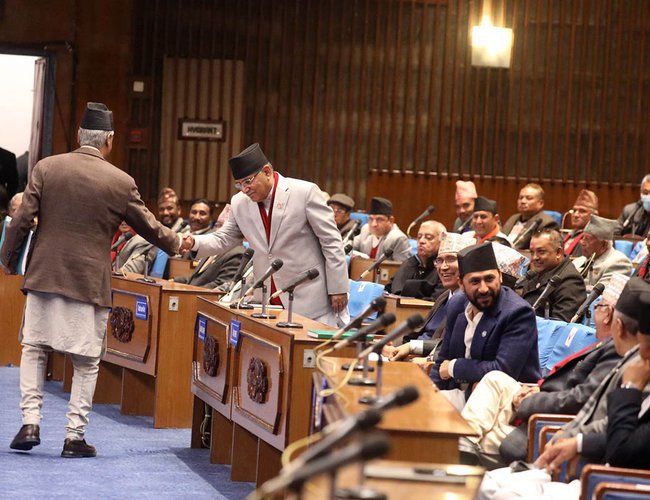
Prachanda said, “State investment in agriculture has not decreased but productivity has not increased. Agricultural loans at subsidised rates will be extended to real farmers.”
He said that the subsidies provided in the agricultural sector will be integrated within this fiscal year and distribution of subsidies and fertilisers will be started from the next year based on the list of farmers.
“Production based subsidy system is being implemented for major food grains and vegetables. The remaining dues of milk farmers are being paid by mid-April 2024.
However, we are not in a situation where the agricultural sector will take a leap with these reforms alone,” he said.
Stating that about 400,000 tonnes of chemical fertilisers have been ensured on time, he said that irrigation facilities have been provided in 21,169 hectares of land in a year through surface and underground irrigation projects.
"Agriculture is no longer possible to conduct in a traditional way. For the transformation of the food system and the agricultural sector, the government is ready to move forward by announcing the Decade of Investment in the Agricultural Sector (2081-2091) to increase investment of the government, private sector, development partners and cooperative sector,” said the Prime Minister.
Prime Minister Prachanda claimed that tourist numbers reached a record high this fiscal year.
The Prime Minister said that while it may sound unbelievable now, he felt that the number of tourists coming to Nepal could double next year. "The Great Lumbini Project, which incorporates an area of eight square kilometres around Lumbini, is moving ahead. The Ramgram and Kapilvastu master plans are under implementation. The government has devised different strategies for tourists from different regions," he said in his speech.
Regarding the operation of the Gautam Buddha and Pokhara international airports, he said that the government would provide subsidies on service charges related to fuel, terminal and ground handling, among others, to incentivise international carriers to fly here. For Gautam Buddha International Airport, he informed that steps were being taken to have small planes operate low-altitude flights from neighbouring countries.
Prachanda also stressed the need to ensure the construction of an international airport at Nijgadh in Bara district. Prime Minister Prahanda faces various challenges in the second half of his term. He will be under pressure from matters like Melamchi and Prasai, and he also faces a challenge from improving connections between the heads of two major groups.
- IME GROUP: Expands Into Paper Industry
- Mar 24, 2025
- CPN UML: Instigated By India
- Mar 23, 2025
- ADB’S CHIEF ECONOMIST: Nepal Reduces Poverty
- Mar 11, 2025
- FM DR. DEUBA: A Successful Visit
- Mar 11, 2025
- MD GHISING: Target Of Personal Grudge
- Mar 09, 2025








